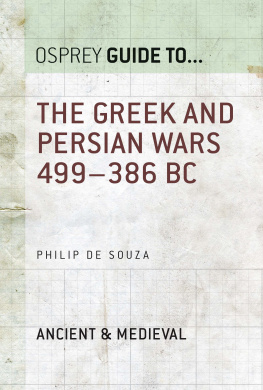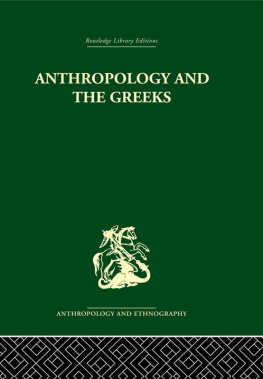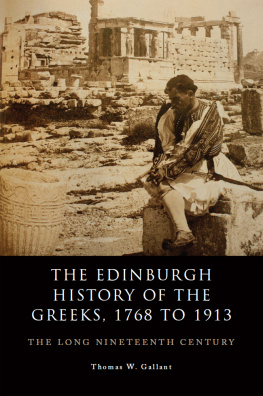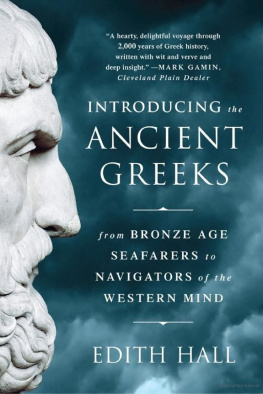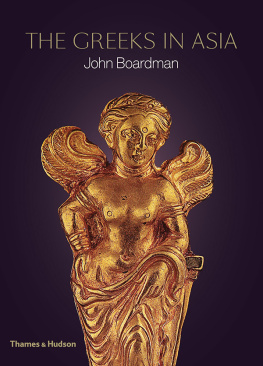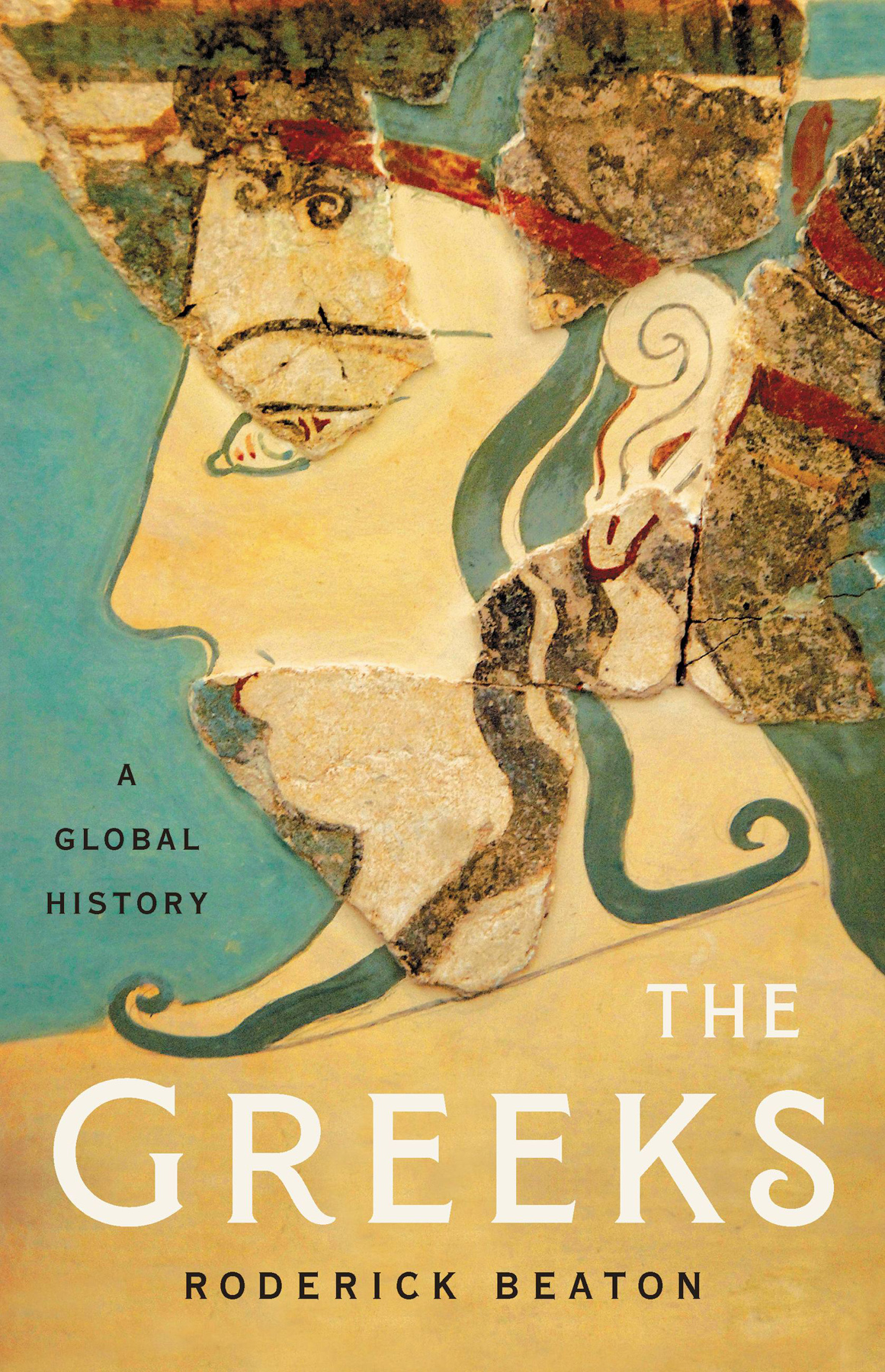A monumental, sweeping history of the Greeks covering more than three thousand years right up to the present day. Authoritative, compelling, and beautifully written. A wonderful book.
Peter Frankopan, author of The Silk Roads
A masterpiece, from a towering expert in all things Greek.
Gregory Nagy, Harvard University
Roderick Beaton has given us a wonderful big picture of the Greeks, with a very generous cross-cultural, temporal, and geographical sweep. At the same time, the books solid detail and careful distinctionsfor example, between the Platonic and the Christian vocabulary for virtueshould help in discouraging political exploitation of stilted, anachronistic ideas about Greek civilization.
Sarah Ruden, translator and author of Paul Among the People
Over three millennia, the locus of the Greek spirit has shifted perpetually. In antiquity it darted about between the cities, harbors, and mountain valleys of the east Mediterranean, moving eventually through the swathes of North Africa, the Levant, and southwest Asia where Alexander and his successors held sway. In modern times, it has flowed between the footloose global diaspora and the two volatile states which embody Greekness. In a tour de force, Beaton has managed to tie this story together in a single compelling narrative, written with deep affection and hard-earned knowledge of all things Greek.
Bruce Clark, author of Athens: A History
A remarkable and readable book: this single, masterful volume lays out the entire thirty-five-century history of the Greek-speaking peoples. From Minoan to modern times, their triumphs, their tragedies, and above all their endurance are all here. For anyone who wants to understand Greece today, this is the place to start.
Ian Morris, author of Why the West Rulesfor Now
Histories of the Greeks have so far been written with a classical or a modern bias, but Beaton does not play favorites: with the vantage-point of a scholar enjoying a deep knowledge of Byzantium as well as all phases of Greek literature, he weaves together a vivid narrative reaching from the age of heroes and lore down to the present. The Greeks emerge not as a single nation but rather as a series of great civilizations. They were often at odds with each other but, in all phases of their long history, contributed cultural capital to the rest of the world. Beatons Greeks are always on the move, self-reflexive, and surprising. Their story has not yet been told in a global fashion, as it is here.
Anthony Kaldellis, Ohio State University
Professor Beaton, already very well known as a formidable and distinguished exponent of modern Greek history, here expands exponentially his vision and chronological scope and turns his more than competent hand to composing a comprehensive history of Greeks, or rather Hellenes, from the Late Bronze Age BCE to the present day. His handsomely illustrated and fully documented text is a consistently illuminating encapsulation of the manifold achievements of one of the globes most creative and inspirational peoples.
Paul Cartledge, Cambridge University
Copyright 2021 by Roderick Beaton
Cover design by Chin-Yee Lai
Cover image Tarker / Bridgeman Images
Cover copyright 2021 by Hachette Book Group, Inc.
Hachette Book Group supports the right to free expression and the value of copyright. The purpose of copyright is to encourage writers and artists to produce the creative works that enrich our culture.
The scanning, uploading, and distribution of this book without permission is a theft of the authors intellectual property. If you would like permission to use material from the book (other than for review purposes), please contact permissions@hbgusa.com. Thank you for your support of the authors rights.
Basic Books
Hachette Book Group
1290 Avenue of the Americas, New York, NY 10104
www.basicbooks.com
First Edition: October 2021
Published by Basic Books, an imprint of Perseus Books, LLC, a subsidiary of Hachette Book Group, Inc. The Basic Books name and logo is a trademark of the Hachette Book Group.
The Hachette Speakers Bureau provides a wide range of authors for speaking events. To find out more, go to www.hachettespeakersbureau.com or call (866) 376-6591.
The publisher is not responsible for websites (or their content) that are not owned by the publisher.
Library of Congress Cataloging-in-Publication Data
Names: Beaton, Roderick, author.
Title: The Greeks : a global history / Roderick Beaton.
Description: First edition. | New York : Basic Books, 2021. | Includes bibliographical references and index.
Identifiers: LCCN 2021012414 | ISBN 9781541618299 (hardcover) | ISBN 9781541618282 (ebook)
Subjects: LCSH: CivilizationGreek influences. | GreeceCivilization. | GreeksEthnic identity. | GreeceHistory.
Classification: LCC CB69 .B43 2021 | DDC 909dc23
LC record available at https://lccn.loc.gov/2021012414
ISBNs: 978-1-5416-1829-9 (print), 978-1-5416-1828-2 (ebook)
E3-20211004-JV-NF-ORI
This book is dedicated to all my Greek friends, acquaintances, former students, and colleagues, wherever they are in the world today, and to the memory of those who are no longer with us.
By so much has our city exceeded all mankind in matters of thought and speech, that her students have become the teachers of others; she has caused the name of Greeks to be understood, not in terms of kinship any more, but of a way of thinking, and people to be called Greeks if they share our educational system, rather than a common ancestry.
Isocrates, Panegyricus (Athens, 380 BCE)
There one can see a western European acquiring his ABCs, a Russian learning Greek, a Byzantine studying the works of the ancient Greeks, and an unlettered Greek learning to spell the ancient language correctly.
Anna Komnene, Alexiad (Constantinople, c. 1150)
The language given to me was Greek:
the poor mans home on Homers sandy shores.
My language is my single care on Homers sandy shores.
Odysseus Elytis, The Axion Esti (1959)
I do not say that we are of the same bloodbecause I have a horror of racial theoriesbut we still live in the same country and we see the same mountains ending in the sea.
George Seferis, speech accepting the Nobel Prize for Literature (1963)
1. The eastern Mediterranean and the Fertile Crescent in the Late Bronze Age.
2. The geopolitical world of the Iliad , after Edzard Visser, Homers Katalog der Schiffe (Stuttgart and Leipzig: Teubner, 1997), 99.
3. Like ants or frogs around a pond: Greek settlements in the seventh and sixth centuries BCE, after Irad Malkin, A Small Greek World: Networks in the Ancient Mediterranean (Oxford: Oxford University Press, 2011), 4, fig. 1.1.
4. The Persian Wars (490 BCE479 BCE).
5. Alexanders expedition and empire, after Simon Hornblower, The Greek World, 479323 BCE , 4th ed. (Abingdon: Routledge, 2011), 292293.
6. The Hellenistic world.
7. The Roman Empire in the late third century CE, after Charles Freeman, A New History of Early Christianity (New Haven, CT, and London: Yale University Press, 2011), map 3.
8. Extent of the Roman Empire at the end of the reign of Justinian (565 CE), after Cyril Mango, The Oxford History of Byzantium (Oxford: Oxford University Press, 2002), 52.
West RulesFor Now: The Patterns of History, and What They Reveal About the Future (London: Profile, 2011), 361, fig. 7.7.
10. The Byzantine Empire in the mid-eleventh century, after Cyril Mango, The Oxford History of Byzantium (Oxford: Oxford University Press, 2002), 178.


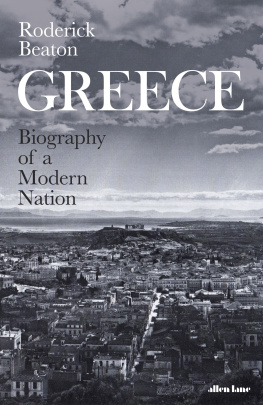
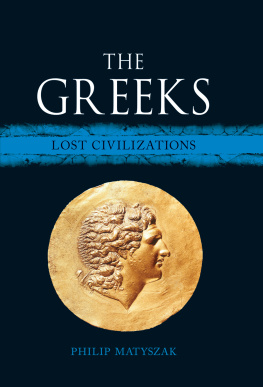
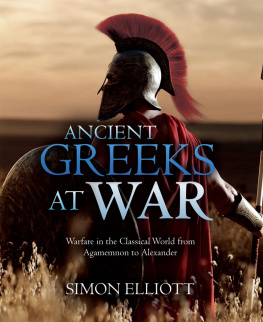
![Michael Lovano - The World of Ancient Greece: A Daily Life Encyclopedia [2 Volumes]](/uploads/posts/book/268736/thumbs/michael-lovano-the-world-of-ancient-greece-a.jpg)
